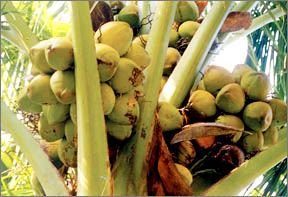Coconut oil the best for cooking purposes, says ICC
by Gamini Warushamana
The Institute of Chemistry Ceylon (ICC) last week cleared coconut
from baseless charges that it was harmful to health and causes heart
disease. The ICC said that for all practical purposes no vegetable oil
including coconut oil, contains cholesterol. There is no direct
relationship between high cholesterol levels and coconut consumption.
 The ICC came to this conclusion after a panel discussion of experts
based their findings on wide scientific research. The ICC came to this conclusion after a panel discussion of experts
based their findings on wide scientific research.
Today in Sri Lanka the average coconut consumption is around 100 nuts
per year per person or 1/3-1/4 nuts per day per person and it is
unlikely that coconut will have a major impact on blood cholesterol
levels, the ICC said.
In the 1970's per capita annual coconut consumption was as high as
225 nuts and even at such a rate of consumption incidents of heart
diseases were rare. "We have been using coconut in our diet for over
1,000 years", experts in the panel said.
Epidemiological studies have not revealed that coconut oil increases
blood cholesterol levels.
However, it is known that in addition to the diet, lifestyle, genetic
and environment factors contribute to a high cholesterol level.
Lifestyle is an overriding factor in the onset of degenerative diseases
such as heart disease, diabetes and hypertension. Genetic factors also
play a role. The effect of coconut should be interpreted in this
context, the ICC said.
According to WHO recommendations the fat intake for a healthy active
person should consist of a certain proportion of Monosaturated Fatty
Acid (MUFA) and Polysaturated Fatty Acid (PUFA) and saturated fats.
Between 20%-30% of energy could be derived from fats where 8%-10% is
from saturated fats and 14%-15% from Monosaturated Fatty Acid and the
balance from Polysaturated Fatty Acid.
Coconut oil is the safest cooking oil because coconut oil is stable
as it has a low degree of unsaturation. Coconut oil also has a high
boiling point and it can be reused 2-3 times for repeated frying,
because trans Fatty Acids cannot be formed in coconut oil during
repeated frying.
Trans Fatty Acids have an adverse health impact because it reduces
HDL (High-density Lipoproteins) level in the body. HDL can remove
cholesterol from arteries. All other vegetable oils such as soya oil
form Trans Fatty Acids therefore are not suitable for use more than once
in frying.
On the other hand when coconut oil is used the amount of oil absorbed
into the food is less compared to unsaturated oils. Polyunsaturated Fats
should not be recommended for frying.
It is mandatory to declare the trans fat content of margarine on the
pack. Under the new labelling regulations it is mandatory to declare the
oil, oil mix and fat content of cooking oil and margarine.
All vegetable oils are cholesterol free and printing that a specific
oil is cholesterol free is misleading. Some manufacturers state that
their margarine has not been hydrogenated during processing so as to
solidify. This is done by using a solid fat matrix.
Trans fat, non trans fat and non coconut fat should be declared on
the label of the margarine pack. However, fully hydrogenated margarine
has no trans fatty acids and this should be declared on the label.
Some research suggests that coconut could give rise to side effects
related to heart disease, by other mechanisms in countries with high
coconut consumption such as Sri Lanka. However, the ICC said that this
matter should be further investigated before conclusions are drawn.
ICC highlighted many positive factors in coconut. Coconut is rich in
luric acid (mono-lurine) which has high a antibacterial and antifungal
effect.
Coconut oil blended with other vegetable oil such as palm oil is a
food grade. However this should be displayed on the label. In the event
of a coconut scarcity in the country blending will reduce coconut oil
production and it will benefit value added productions such as
desiccated coconut, ICC said.
ICC has also made recommendations for processing and quality control
in the coconut industry. As a remedy to prevent adulteration the ICC
proposes a recommended standard for coconut oil and advocates that the
pre market monitoring approach followed today should be changed to
pre-market quality assurance.
Since bulk marketing and packing of coconut oil in drums for food
usage has many hazards this practice should be discouraged. Small scale
domestic production should be encouraged by institutions such as the
Coconut Development Authority and Coconut Research Institute. Bulk
marketing of coconut oil should also be improved in the same manner as
palm oil.
The process control standard should be stabilised to monitor
polycyclic aromatic hydrocarbons and aflotoxin in copra. Preventive
action should be taken at ground level and monitoring should be done at
an accredited laboratory, ICC said.
A national quality standard should be introduced by the Sri Lanka
Standards Institute for products such as canned coconut milk, bottled
coconut milk, coconut milk powder, coconut cream and coconut paste.
The nutritional value of these products should be compared to
traditional coconut products, ICC said.
The panel of professionals, who studied medical, nutritional and
bio-chemical aspects of coconut and coconut oil included. Prof. E. R.
Jansz (Chairman), Prof. T. W. Wickramanayake, B. S. P. Mendis, E. G.
Somapala, Dr. D. P. Athukorala, Dr. U. P. S. De S. Widyanatha, Dr.
Nandani Ediriweera, Kumudu Samarasekara, Dr. Kapila Seneviratne, Dr.
Sujatha Hewage, Dr. Lakshimi Arambawela and Prof. Siromi Samarasinghe.
[email protected]
|
